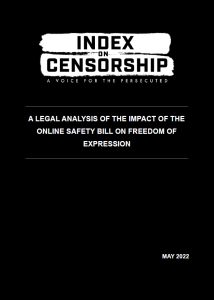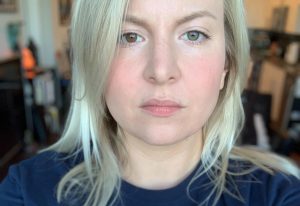4 May 2022 | News and features, United Kingdom
 The Online Safety Bill has simple, laudable aims – to make the online sphere more safe. But despite almost seven years of debate, thousands of hours of Parliamentary scrutiny, analysis from civil society, business and the media, there is still significant uncertainty about how the Bill will work in practice. The Government is still not able to define terms at the heart of the legislation such as “legal but harmful” or give the as many as 180,000 technology companies big and small who will implement this new legal framework clear guidance on how this landmark legislation should operate.
The Online Safety Bill has simple, laudable aims – to make the online sphere more safe. But despite almost seven years of debate, thousands of hours of Parliamentary scrutiny, analysis from civil society, business and the media, there is still significant uncertainty about how the Bill will work in practice. The Government is still not able to define terms at the heart of the legislation such as “legal but harmful” or give the as many as 180,000 technology companies big and small who will implement this new legal framework clear guidance on how this landmark legislation should operate.
To fill this gap and help explain what the Bill will mean in practice, the Legal to Say Legal to Type campaign has instructed media law expert Gavin Millar QC of Matrix Chambers to produce the first analysis of the implications of the Online Safety Bill on UK citizens’ freedom of speech.
The QC’s opinion explains and analyses the broad implications of the Government’s new online safety regime against current freedom of expression laws and found that the Bill will significantly curtail freedom of expression in a way that has profound consequences for the British media and journalism, courts and the UK’s digital economy. The Bill gives the Secretary of State overseeing the legislation unprecedented powers to curtail freedom of expression with limited parliamentary scrutiny.
The Bill, which received a second reading in Parliament on 19 April, does not comply with Article 10 of the European Convention on Human Rights, and far from the claim of the Culture Secretary that the Bill will protect free speech it actively undermines existing legal protections in an unprecedented manner. This new analysis shows how the Online Safety Bill as currently drafted ends the historic principle in law that people can publish what they like, unless the state specifically and clearly passes laws to the contrary.
This report is not a comprehensive dissection of the flaws in the Bill which are too vast to deal with succinctly. For example, the UK Independent Reviewer of Terrorism Legislation, Jonathan Hall QC has recently publicly criticised the Bill as being “ineffective on terrorism”. The chief criticism he lays is that “the Bill defines ‘terrorism content’ by reference to terrorism legislation, but ignores intention and defences. This leads to some very odd outcomes. It’s hard to see how it provides a workable framework for regulation.”
The ambiguity of the drafting and the lack of governmental consideration on the Bill’s intersection with existing linked areas of law is indeed staggering. The idea that speech can be lawfully moderated without properly adjudicating on an individual’s intention and the context of the speech is nonsensical – irrespective of whether your concern is terrorism, crime or freedom of expression.
Index on Censorship believes that the consequences of the Bill (intended and unintended) go beyond what has been considered in Parliament to date, for example:
- The Bill violates freedom of speech as defined in UK and international law.
- Protections for media content are not as wide as existing human rights for journalists
- Pro-active state-enforced censorship by algorithm has questionable legality.
- New powers for platforms such as Meta, Twitter, and even companies like Apple, will mean they may be performing functions of a public nature under the “Duty of Care” and could be subject to judicial review.
- The Secretary of State for Digital, Culture, Media and Sport will have an unparalleled ability to censor.
- The proposal to proactively monitor private communications lack safeguards for journalistic or legally privileged material.
The Government has ended up in this position having disregarded all the learnings from regulation of the online space over the last twenty years, including some of the fundamental building blocks of the internet namely intermediate liability protections. This is despite pre-legislative scrutiny identifying flaws in the draft Bill.
In summary, the legal advice, published in full in this report, found:
- The regime proposed by the Bill does not contain the statutory safeguards that would be required to prevent or limit the risk of violations of the right to freedom of expression.
- The structure of regulation offers no prospect of ‘fact-specific’ adjudications on speech.
- Harmful speech has no legal basis and risks restrictions on speech that are too broad and therefore open to abuse through selective enforcement.
- On the face of the Bill there appears to be a risk that platforms, and possibly Ofcom, may access confidential journalistic material in carrying out their statutory functions.
- ‘Democratic importance’ protections are not as wide as existing human rights protections as they only cover a limited form of political expression.
The report is available to read in full below or to download here.
22 Apr 2022 | China, News and features, Russia, United States
A new report from civil rights group GreatFire has revealed that Apple acts on virtually every takedown request it receives from the Chinese and Russian governments for apps in its App Store, a far higher compliance rate than with requests from other governments.
The report, Taken Down: A Look into Apple’s Transparency, is published this month as part of GreatFire’s AppleCensorship campaign. Written in collaboration with Apple whistleblower Ashley Gjovik, it reveals that the tech company receives an app “takedown” request from a government every 2.5 days on average and removes an app from the App Store every 16 hours. Overall, Apple complies with 74% of these requests, but in the cases of China and Russia the rate is 98% and 95% respectively.

Apple whistleblower Ashley Gjovik is co-author of the new report
Gjovik, who wrote the report’s foreword, was fired by Apple after complaining about toxic waste under her office. Her case was first raised by Index last year. She said of the findings: “Human rights are not determined by borders on maps, or by borders between the physical and online worlds. Freedom of expression is a fundamental right which must be protected: everywhere. Private corporations should not be allowed to deprive people of their rights, nor should we tolerate off-the-record, backroom discussions between corporations and authoritarian governments. We must demand transparency, respect, and dignity.”
Benjamin Ismail, AppleCensorship project coordinator and GreatFire’s campaign and advocacy director, added: “[Apple] must acknowledge the deeply flawed management of its App Store and start taking the necessary steps to prevent government-led and corporate censorship from depriving millions of users of their fundamental rights to access to information and freedom of expression.”
The report calls for more detailed disclosures in Apple’s Transparency Reports, which simply publish the number of take-down requests and the number of apps removed but provide no further information. There is no information, for instance, about the apps themselves, what laws they are alleged to have breached or the legitimacy of the government requests.
Ashley Gjovik first began to raise questions about toxic vapour intrusion under her office, which, like much of Silicon Valley, was built on polluted industrial land. She had become ill after discovering a similar problem under her apartment block and began to ask questions when Apple staff were asked to return to work after the Covid-19 pandemic.
After a six month battle over the contamination, her contract was finally terminated on the grounds that she had disclosed “confidential product-related information”. This refers to concerns Gjovik raised about experiments carried out on Apple employees involving facial identification and studies of ear canals. Gjovik now believes the corporation retaliated against her for raising her concerns about the risk to her and her fellow employees from the pollution. But instead of walking away she has continued to pursue Apple over its record on safety, privacy and labour rights, both in the United States and Europe.
Gjovik, who was training as a lawyer while working at Apple and now specialises in human rights law, has since taken on numerous cases against Apple. She told Index: “They all focus on one end goal: initiating a serious, global conversation about how to reset domestic and international relationships with these megacorporations. We need to demand transparency, accountability, legal compliance and a workforce that is treated with dignity.”
8 Apr 2022 | Opinion, Russia, Ruth's blog, Ukraine
There are some images that touch your heart and make you want to weep. Images that become iconic for an event in history. The Tank Man in Tiananmen Square. Rosa Parks’ arrest picture. The picture of Alan Kurdi dead on the beach. The couple kissing on VE Day. Piles of shoes and suitcases at Auschwitz.
These images live in the public consciousness. And a new one joined their ranks this week.
On Monday evening I checked social media just before bed. There was a huge part of me that wished I hadn’t because an image on my feed made me cry.
I saw an image of a toddler in a nappy. Her mother had taken the heart-wrenching decision to write on her daughter’s back. The words give details of who to contact in the event that her parents were killed. Sasha Makoviy, a Ukrainian artist, watching the horror around her felt this was the best way to protect her daughter.
I really don’t have the words to express the horror or fear that that image speaks to.
Images stick with us forever. And the picture of an innocent toddler whose parents are preparing for their own deaths because of the actions of a tyrant will stay with me forever.
Index provides a voice for dissidents. Today we also provide a platform for that little girl and the horrors her family, and many others, are facing as I type.
We stand with Ukraine. We stand with democracy. We stand with peace.
6 Apr 2022 | News and features, Russia, Ukraine

Evgeny Kissin, one of the most famous pianists in Russia, has described Vladimir Putin as a “bloodthirsty criminal”. Photo: Wikimedia Commons/Gkobe
The world in which Index on Censorship was born seems to be reemerging. In August 1968, after the blossoming of freedoms in Czechoslovakia known collectively as the Prague Spring, the Soviet Union invaded the country. Protesters were brutally crushed. Despite the violence and the stranglehold on freedoms back in Russia, eight fearless dissidents took to Red Square in Moscow to demonstrate.
One of the bold demonstrators was Pavel Litvinov, a young physicist at the time. In that same year Litvinov had co-authored a pamphlet entitled Appeal to World Public Opinion, asking those in the west to fight against the suppression of dissent in the Soviet Union. The poet Stephen Spender responded, suggesting the creation of an international committee whose goal would be to support the democratic movement in the USSR. This committee would engage writers, scholars, artists and public personalities from countries like the UK, the USA and also Latin American nations.
This is how Index on Censorship was brought into life, responding to the call of these dissidents and giving them a voice.
More than 50 years later, the USSR doesn’t exist anymore, but Russia has shocked the world with the invasion and consequential brutal war in Ukraine. What remains is the courage and bravery of people and dissidents defying the regime of Vladimir Putin. Below are just six of the noticeable Russian citizens who’ve spoken up against Putin and the war in Ukraine.

Russian artist Victoria Marchenkova, who’s been using Facebook to encourage people in Ukraine to flee to Canada. Photo: Wikimedia Commons/Na4ya
“STOP THE WAR” – that’s what the Moscow-born artist Victoria Marchenkova wrote on her website. Marchenkova works with different styles, but with one thing in mind: approaching the economic situation of the world, international traditions and its heritage. After the war in Ukraine began, she announced on her website that her solo exhibition at a Moscow gallery had been delayed until the end of the Russian invasion. Her exact words? “Please let’s save the world all together. STOP THE WAR”. Very active on Facebook, she has also encouraged people in Ukraine to flee to Canada.[/vc_column_text][vc_custom_heading text=”2. Evgeny Kissin – pianist”][vc_column_text]The pianist Evgeny Kissin has been an important name from Russia who declared himself against the war. In a solemn video titled Note of Protest, Kissin called Russia’s invasion of Ukraine a crime that has no excuse and also described Vladimir Putin as a bloodthirsty criminal. “Sadly, far from all who initiate criminal wars are punished, but none escape the judgment of history,” Kissin said. The video was published on his Instagram account and was viewed around 100,000 times.[/vc_column_text][vc_custom_heading text=”3. Mikhail Gelfand – biologist”][vc_column_text]Renowned Russian biologist Mikhail Gelfand is considered one of the most important people in the area of molecular evolution, comparative genomics and systems biology. He was the main person behind a letter signed by approximately 7,000 Russian scientists against the war in Ukraine. It’s a bold move. The Russian president has said that every Russian citizen who questions his invasion of Ukraine will be treated as a traitor and that a necessary self-purification of society will help to strengthen the country.[/vc_column_text][vc_custom_heading text=”4. Marina Ovsyannikova – journalist”][vc_column_text]
Daughter to a Russian mother and an Ukrainian father, Marina Ovsyannikova is a Russian journalist who had a job on the Channel One Russia TV channel. She gained prominence after she broke into a state-controlled Russian TV news broadcast and protested against the war. As a result, she was arrested and fined, but was released afterwards. Today, while she waits trial for interrupting the news programme, she is very active on her Instagram account. If convicted, she could be sentenced to 15 years in prison. In a recent post on Instagram, she wrote: “I wanted to demonstrate to the world that not all Russian people believe the same and I believe that many people… are against the war.”

This video grab shows Russian Channel One editor Marina Ovsyannikova holding a poster reading ” Stop the war. Don’t believe the propaganda. Here they are lying to you” during on-air TV studio by news anchor Yekaterina Andreyeva, Russia’s most-watched evening news broadcast. Photo: Zuma Press/Alamy
[/vc_column_text][vc_custom_heading text=”5. Ilya Varlamov – blogger”][vc_column_text]The Russian Youtuber from Moscow has been speaking openly about the war in Ukraine on his Youtube channel, which is focused on analysing politics in Russia. Often critical in tone he has interviewed people such as Alexei Venediktov, the former editor-in-chief of the now-closed Ekho Moskvy. He has more than 3.3 million subscribers, where he’s been publishing videos almost daily. At the time of print, Varlamov had not been detained for his criticisms. He does have some experience of this though; he was briefly arrested in South Sudan after security found the remote control of a drone in his luggage, accusing him of trying to film military activities with the drone.

Russian Youtuber Ilya Varlamov. Photo: Wikimedia Commons/Mitya Aleshkovskiy
[/vc_column_text][vc_custom_heading text=”6. Youri Doud – blogger”][vc_column_text]Born in East Germany in 1986, Youri Doud sees himself as Russian by identity. He’s worked as a freelance journalist and in 2017 he launched a Youtube channel with the purpose of interviewing Russian celebrities. After Russia began its so called “mission” in Ukraine, Doud shared on his Instagram account a song called 100-year War, written by the group Noize MC, which has achieved millions of likes and reactions. The song discusses what artists should do when it’s not within their power to change a political catastrophe which is developing. The conclusion of the band is short and clear: “We have no other choice than to honestly speak up about what is happening. So that’s what we are doing.
 The Online Safety Bill has simple, laudable aims – to make the online sphere more safe. But despite almost seven years of debate, thousands of hours of Parliamentary scrutiny, analysis from civil society, business and the media, there is still significant uncertainty about how the Bill will work in practice. The Government is still not able to define terms at the heart of the legislation such as “legal but harmful” or give the as many as 180,000 technology companies big and small who will implement this new legal framework clear guidance on how this landmark legislation should operate.
The Online Safety Bill has simple, laudable aims – to make the online sphere more safe. But despite almost seven years of debate, thousands of hours of Parliamentary scrutiny, analysis from civil society, business and the media, there is still significant uncertainty about how the Bill will work in practice. The Government is still not able to define terms at the heart of the legislation such as “legal but harmful” or give the as many as 180,000 technology companies big and small who will implement this new legal framework clear guidance on how this landmark legislation should operate.





